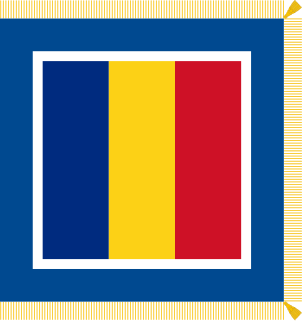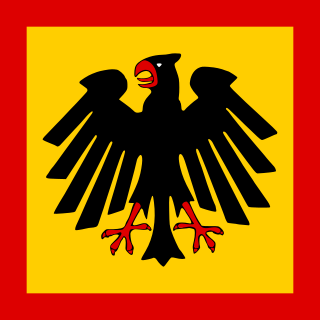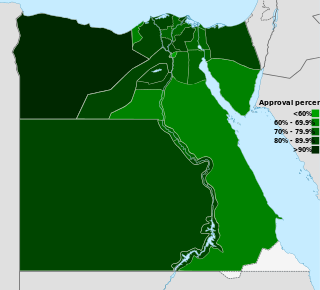
The Constitution of the Republic of China is the supreme law in the Republic of China. It was ratified by the Kuomintang led National Constituent Assembly session on December 25, 1946 in Nanking and adopted on December 25, 1947. Though the Constitution was intended for the whole China, it has never extensively nor effectively been implemented in any territory. In response to the outbreak of Chinese Civil War by the time of the constitution's promulgation, the newly elected National Assembly soon ratified the Temporary Provisions against the Communist Rebellion on May 10, 1948. The Temporary Provisions symbols the country's entering into the state of emergency and granted the Kuomintang led government of the Republic of China extra-constitutional powers.

The President of Romania is the head of state of Romania. The President is directly elected by a two-round system for a five-year term. An individual may serve two terms. During his/her term in office, the President may not be a member of any political party.

The President of the Republic of Liberia is the head of state and government of Liberia. The president serves as the leader of the executive branch and as commander-in-chief of the Armed Forces of Liberia.

The Reichspräsident was the German head of state under the Weimar constitution, which was officially in force from 1919 to 1945. In English he was usually simply referred to as the President of Germany. The German title Reichspräsident literally means President of the Reich, the term Reich referring to the federal nation state established in 1871.

The President of Pakistan, is the head of state of the Islamic Republic of Pakistan and the civilian Commander-in-Chief of the Pakistan Armed Forces, per the Constitution of Pakistan. The office-holder represents the "unity of the Republic". The current President of Pakistan is Arif Alvi.

Latvia elects on national level a legislature. The Saeima has 100 members, elected for a four-year term by proportional representation with a 5% threshold. An unmodified Sainte-Laguë method is used to allocate seats. The parliamentary elections are held on the first Saturday of October. Locally, Latvia elects municipal councils, consisting of 7 to 60 members, depending on the size of the municipality, also by proportional representation for a four-year term.
Estonia elects a legislature on the national level. The Riigikogu has 101 members, elected for a four-year term by proportional representation. A head of state - the president - is elected for a five-year term by parliament or an electoral college. Locally, Estonia elects local government councils, which vary in size. Election law states the minimum size of a council depending on the size of municipality. Local government councils are elected by proportional representation too.

Elections in Syria gives information on election and election results in Syria.

The House of Representatives is the lower chamber of the bicameral legislative branch of Liberia, and together with the Senate comprises the Legislature of Liberia. The number of seats is fixed by law at 73, with each county being apportioned a number of seats based on its percentage of the national population. House members represent single-member districts within the counties drawn up by the National Elections Commission and serve six-year terms. The House meets at the Capitol Building in Monrovia.

The Senate is the upper house of the bicameral legislative branch of Liberia, and together with the House of Representatives comprises the Legislature of Liberia. Each of the fifteen counties are equally represented by two senators, elected to serve staggered nine-year terms. The Senate meets at the Capitol Building in Monrovia.

The Chairman of the Senate of Pakistan, is the president-chair of the Senate of Pakistan. According to the Constitution of Pakistan, the chairman is a presiding official and that Senate must choose a chairman and deputy chairman for a time interval of three years.

The Constitution of Azerbaijan was adopted on 12 November 1995 by popular referendum. This Constitution was the first Constitution of independent Azerbaijan, the Azerbaijan Democratic Republic founded in 1918 and existed 23 months until 1920 was not able to adopt its constitution. Therefore, the history of Constitution building in Azerbaijan generally starts from the period of Azerbaijan being part of Soviet Union. The first Constitution of Azerbaijan SSR was adopted in 1921 and was in accordance with the Constitution of USSR. The last Constitution of Azerbaijan SSR was adopted on 21 April 1978 and also was in line and form of USSR Constitution. The first Constitution of independent Azerbaijan consists of 5 chapters, 12 sections and 147 articles. It was amended on 24 August 2002 and again on 18 March 2009. It carries the "highest legal force" in Azerbaijan as per article 147. The most recent amendments to the Constitution were approved after the Constitutional referendum held on 26 September 2016. In 2002, 31 amendments were made to 22 articles; in 2009, 41 amendments were made to 29 articles; and in 2016, 23 articles were amended and new 6 new articles were added.

The Constitution of Liberia is the supreme law of the Republic of Liberia. The current constitution, which came into force on 6 January 1986, replaced the Liberian Constitution of 1847, which had been in force since the independence of Liberia. Much like the 1847 Constitution, the Constitution creates a system of government heavily modeled on the Federal Government of the United States.

The Constitution of Ivory Coast was approved by referendum on October 30, 2016 and officially adopted on November 8, 2016.

A referendum to amend the Constitution of Liberia was held on 23 August 2011. Voters chose whether to ratify four amendments regarding judge tenure, elections scheduling, presidential candidate requirements and the electoral system. The National Elections Commission of Liberia (NEC) oversaw the referendum.

General elections were held in Liberia in 1939. It was the first presidential election since 1931, as special legislation approved by a referendum in 1935 had extended Edwin Barclay's term from four to eight years. Barclay, a member of the True Whig Party, was the only candidate, and was re-elected unopposed.

A constitutional referendum was held in Egypt on 19 March 2011, following the 2011 Egyptian revolution. More than 14 million (77%) were in favour, while around 4 million (23%) opposed the changes; 41% of 45 million eligible voters turned out to vote.

A constitutional referendum was held in Liberia on 4 May 1943, alongside general elections. The changes to the constitution required the president to be a Liberian citizen by birth or to have lived in Liberia for at least 25 years, as well as allowing constitutional referendums to be held separately from general elections. The changes were approved by voters.

The Additional Articles of the Constitution of the Republic of China are the revisions and constitutional amendments to the original constitution to meet the requisites of the nation and the political status of Taiwan. The Additional Articles is usually attached after the original constitution as a separate document. It also has its own preamble and article ordering different from the original constitution.

The Tunisian Constitution of 2014 was adopted on 26 January 2014 by the Constituent Assembly elected on 23 October 2011 in the wake of Tunisia's Jasmine Revolution that overthrew President Zine El Abidine Ben Ali. It was passed on 10 February 2014, replacing the constitutional law of 16 December 2011 that temporarily formed the basis of government after the suspension of the Constitution of 1959.
















